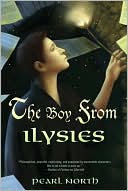What I learned from The Boy From Ilysies
This is the second book in the Libyrinth trilogy by Pearl North, and I think the cover blurb from Realms of Fantasy is accurate: “Philosophical, powerful, captivating, and populated by memorable characters.”
Because of my own writing interests, it is the “philosophical” that draws me most to this story. Here is the first paragraph on the dust jacket of my copy: “On a world where the only ties to Earth appear to be the books stored and protected in the vast library known as the Libyrinth, a battle once raged between the Singers, who for generations beyond remembering relied on oral storytelling to transmit knowledge, and the Libyrarians, who dedicated their lives to preserving the wisdom stored in books.” The plot of the first book, Libyrinth, basically covers the war between those who believe in the written word and those who don’t.
But the trilogy is philosophical beyond matters of literacy. There are several societies in Pearl North’s world, and besides the question of literacy, these societies are defined by their cultural definitions of the roles of women and men. The Boy From Ilysies is primarily the story of Po, a young man raised in a society where men serve women. As an exile from his homeland, he struggles with his role as a man in a new society where men and women are equals. Expectations and cultural norms are questioned by many characters in the story as the characters from different walks of life try to understand each other.
This book is useful to me as an example of how characterization, world-building, and plot are intertwined. Several major plot points revolve around decisions characters make as a result of their cultural upbringing or reaction to that upbringing. For example, Po makes the mistake of falling into his old role of subservience to a woman and almost destroys the budding utopia he calls home. This disaster drives the plot for the rest of the novel. On a related note, I paid particular attention to how North’s characters speak of and think about the differences among them and the changes certain characters undergo throughout the book.
I also found this book useful because it contains one heck of a magical object. I can’t wait to see what happens with it in the final installment of the series.


Thanks for posting about BOY, Jen. I’m glad you got so much out of it!